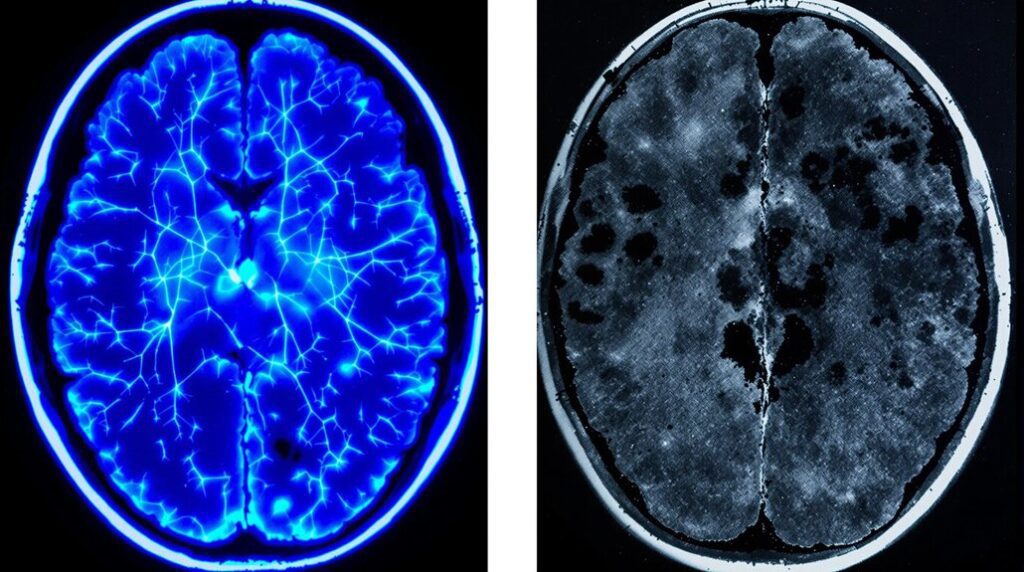Dementia isn’t a specific disease but rather a general term for symptoms that affect memory, thinking, and social abilities. Alzheimer’s disease is actually a type of dementia – the most common type – accounting for 60-80% of all dementia cases. While both conditions involve cognitive decline, Alzheimer’s specifically destroys brain cells in a progressive pattern, leading to memory loss, confusion, and behavioral changes. Understanding these key differences can help you identify warning signs and explore treatment options.
Defining Dementia: A Broad Medical Category
While many people use the terms interchangeably, dementia isn’t a specific disease but rather a general term describing a group of symptoms that affect memory, thinking, and social abilities severely enough to interfere with daily life.
When you’re helping someone with dementia, you’ll notice various symptoms depending on the underlying cause. Different types of dementia can manifest through memory loss, confusion, difficulty communicating, or changes in behavior.
Several conditions can trigger these symptoms, including vascular problems, infections, or progressive diseases that damage brain cells.
Understanding dementia causes will help you provide better care. While some risk factors like age and genetics aren’t controllable, you can support brain health through lifestyle modifications such as proper nutrition, regular exercise, and cognitive stimulation activities.
Brain-stimulating activities provided by trained caregivers can help improve mental function and maintain structured daily routines for those with dementia.
Understanding Alzheimer’s Disease as a Type of Dementia
Although many types of dementia exist, Alzheimer’s disease stands as the most common form, accounting for 60-80% of all dementia cases. This progressive brain disorder gradually destroys your cognitive abilities, particularly affecting memory and thinking skills.
Alzheimer’s dominates dementia diagnoses, affecting up to 80% of cases while steadily eroding memory and cognitive function.
You’ll notice Alzheimer’s progression typically begins with mild memory decline, making it challenging to recall recent conversations or events.
As the disease advances, you might observe your loved one experiencing increased confusion, changes in behavior, and difficulty with daily tasks. They may struggle to recognize familiar faces, manage finances, or maintain personal care.
Understanding Alzheimer’s as a specific type of dementia helps you provide more targeted care and support. While there’s no cure yet, early diagnosis allows families to access appropriate treatments and plan for future care needs.
Professional caregivers can help manage these challenges through memory-boosting exercises and structured daily routines that minimize confusion and anxiety.
Key Symptoms and Warning Signs
Recognizing early warning signs can make a significant difference in managing both Alzheimer’s and other forms of dementia.
You’ll want to monitor your loved ones for cognitive decline and changes in their daily functioning. While some symptoms overlap between different types of dementia, there are distinct patterns you should watch for.
- Memory loss that disrupts daily life, such as forgetting recently learned information or important dates, along with increased reliance on memory aids
- Language difficulties, including trouble finding the right words during conversations and following complex instructions
- Spatial disorientation leading to getting lost in familiar places and difficulty with depth perception
- Behavioral and emotional changes, including unexplained mood swings, social withdrawal, and loss of interest in previously enjoyed activities
Professional assessments can help determine the appropriate level of care needed as these symptoms progress and impact daily activities.
Diagnostic Process and Testing Methods
Since diagnosing dementia and Alzheimer’s requires multiple steps, doctors use a thorough approach to rule out other conditions and determine the specific type of cognitive impairment.
You’ll undergo an extensive evaluation that includes physical exams, medical history reviews, and cognitive assessments. Your doctor will apply specific diagnostic criteria while checking for reversible causes of memory problems, such as vitamin deficiencies or thyroid issues.
Testing techniques may include brain imaging (MRI or CT scans), blood tests, and specialized memory evaluations.
If you’re supporting a loved one through this process, you’ll want to accompany them to appointments and help provide detailed information about changes in their behavior and daily functioning.
This information helps healthcare providers make accurate diagnoses and develop appropriate treatment plans.
Medical social workers can provide invaluable emotional support and care coordination throughout the diagnostic journey.
Treatment Approaches for Both Conditions
While neither Alzheimer’s nor dementia can be cured, several treatment approaches can help manage symptoms and improve quality of life.
Working with healthcare providers, you’ll develop a thorough treatment plan that may combine medication options and therapy techniques tailored to your loved one’s specific needs.
- Medications like cholinesterase inhibitors and memantine can help manage cognitive symptoms and memory loss
- Behavioral therapy helps address mood changes, agitation, and communication challenges
- Occupational therapy teaches adaptive skills for daily activities and maintains independence
- Physical therapy and exercise programs improve balance, strength, and overall well-being
Skilled home care services can provide professional support and specialized therapy in the comfort of your loved one’s home environment.
You’ll need to monitor your loved one’s response to treatments and work closely with their healthcare team to adjust approaches as needed.
Regular assessment guarantees the most effective combination of treatments for their changing condition.
Risk Factors and Prevention Strategies
Understanding risk factors plays an essential role in managing both Alzheimer’s and dementia. While you can’t control genetic predisposition, you can modify lifestyle factors to reduce your risk. Focus on maintaining brain health through regular exercise, a balanced diet, and social engagement.
| Risk Factors | Prevention Strategies |
|---|---|
| Age over 65 | Stay physically active |
| Family history | Maintain social connections |
| Heart conditions | Follow Mediterranean diet |
| Head injuries | Challenge your brain daily |
You’ll benefit from making proactive choices like quitting smoking, managing blood pressure, and getting quality sleep. If you’re caring for someone with these conditions, encourage them to participate in mentally stimulating activities and maintain regular medical check-ups. Remember, early intervention often leads to better outcomes, so don’t hesitate to seek professional help if you notice cognitive changes.
Impact on Daily Life and Family Relationships
As both Alzheimer’s and dementia progress, they fundamentally reshape daily routines and family dynamics.
You’ll notice significant changes in how your loved one manages everyday tasks and interacts with family members. These conditions often create caregiver challenges that can strain relationships but also bring families closer together through shared caregiving responsibilities.
- Your loved one may need help with basic activities like dressing, eating, and personal hygiene, requiring you to adjust your schedule and priorities.
- Communication patterns will change, demanding more patience and new ways of connecting.
- Family dynamics shift as roles reverse, with adult children often becoming primary caregivers for their parents.
- Financial and emotional stress can impact the entire family unit, making support networks and respite care essential.
Research Breakthroughs and Future Outlook
Recent scientific breakthroughs have transformed our understanding of both Alzheimer’s and dementia, offering new hope for future treatments. Research advancements in brain imaging, biomarkers, and genetic testing now help doctors diagnose these conditions earlier and more accurately than ever before.
Modern science gives us powerful new tools to detect and understand Alzheimer’s and dementia, paving the way for breakthrough treatments.
You’ll find that scientists are developing promising future therapies targeting the underlying causes of these diseases. These include medications that remove harmful protein buildup in the brain and treatments that reduce inflammation.
Researchers are also exploring lifestyle interventions, such as diet and exercise programs, that may help prevent or slow disease progression.
While there’s still no cure, you can take comfort in knowing that these developments are bringing us closer to more effective treatments for both conditions, potentially improving quality of life for millions of patients and their families.
Conclusion
Think of dementia and Alzheimer’s like a garden: dementia is the whole garden, while Alzheimer’s is the largest flower bed within it. While learning about these conditions might feel overwhelming at first, there’s always hope and help available. Just as a garden needs daily care, people with these conditions need ongoing support and understanding. You don’t have to figure everything out alone – trained professionals can guide you through each step of the journey, from early signs to daily care routines.
Remember, getting help early makes a big difference, just like catching a wilted plant in time can save it. With proper care and support, many people with these conditions can maintain a good quality of life for years. You’re part of a caring community of families, caregivers, and medical professionals who understand what you’re going through.
If you or a loved one need help, don’t wait. Reach out to Focus Family Care today at (561) 693-1311 or email us at info@focusfamilycare.com.





